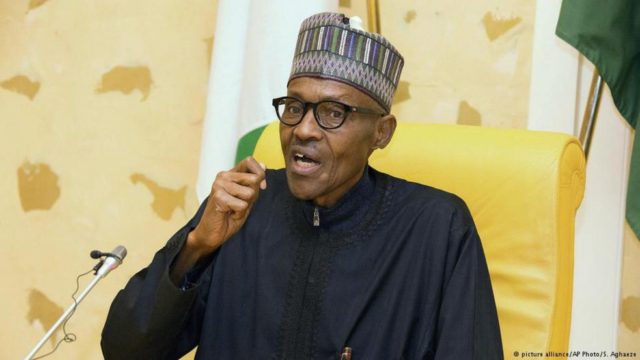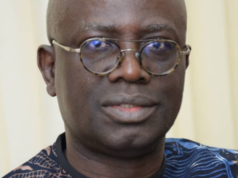
President Muhammadu Buhari
If the German-speaking Jewish writer Franz Kafka were in Nigeria now, he would observe that it is not only in the imaginative space that there are boundless possibilities in the depiction of the human condition. A validation of his art would have been that his brand of surrealism that is a staple of the imaginative provenance has assumed actuality in the human realm. In that case, Kafka would have been spared being sniggered at on account of Samsa Gregor, a human being, mutating into a vermin in his The Metamorphosis.
This kind of validation was the lot of Chinua Achebe when his prediction in A Man of the People of the epochal termination of the nation’s first democratic experience was fulfilled by the military who sacked the wayward politicians of the 1960s and triggered a series of cataclysmic events that provoked the civil war. But Kafka and Achebe would have been at the same time amused and shocked that the boundless and surrealistic possibilities in their fictional worlds could be located in the realm of actuality in Nigeria – even beyond their imagination.
Such a literary marvel that would have seemed only possible in the imaginative worlds of Kafka, Achebe and other writers is a situation where the dead lead the living. This would remain as one of the major innovations of Nigeria to the development of humanity, especially in the area of governance. Of course, we are not just realising that Nigeria has the capacity to introduce this to human development. It has always been there. It is the possibility of the dead leading the living in Nigeria that Achebe euphemises in The Trouble with Nigeria when he laments that his country is fated to being led by not even its second ‘eleven’ but the eleventh ‘eleven.’ The eleventh ‘eleven’ are dead to all the imperatives of merit, justice, equality, moderation and sensitivity to the plight of those they are presiding over their affairs. But death is not only in the realm of metaphor. As we have observed since the return of democracy in 1999 after the exit of the military from the political arena, some of our leaders are actually dead to good health and they use the time they are supposed to think of good governance to search for medical treatment in overseas hospitals.
But what must not elude us is that the credit that duly goes to President Muhammadu Buhari is that it is under his government that the possibility of the dead leading the living is brazenly demonstrated. In fact, this possibility is flaunted at the citizens. And if the latter attempt to ask any questions, government officials feel affronted. This brazen character of the possibility of the dead leading the living being projected by the Buhari government has vitalised the imagination of Nigerians. They have thus alerted us to the fact that the system of government being practised by Buhari, his officials and political party could be referred to as either deadocracy or corpsocracy .Or how do you explain the Buhari government giving appointments to the dead as chairmen or members of the boards of government parastatals and agencies? The list of the dead is getting longer with the passage of each day. But so far, the list contains the names of nine dead persons. They include: Francis Okpozo, Chairman of the Nigerian Press Council; Donald Ugbaja, a board member of the Consumer Protection Council; Christopher Utov, a board member of the Nigerian Institute of Social and Economic Research; and Garba Attahiru, Umar Dange, Nabbs Imegwu and Azuzu Okpalaibekwe who were given other positions and boards.
Since deadocracy or corpsocarcy is a government of the dead for the dead, it is no accident that that there has been a spectre of death over the nation since the emergence of Buhari as the president. Obviously, what Buhari failed to add to his 2011 apocalyptic prediction was that it was not only when he lost but also when he won that the baboons and dogs would be soaked in blood. The agents for the fulfillment of this prophecy are multiple. They come in the form of wrongheaded policies that neglect the socio-economic wellbeing of the citizens leading to their untimely death. They are in the form of the neglect of the nation’s health care system that dooms the citizens to their early death. But more importantly, they come in the form of herdsmen on the prowl, looking for whom to devour. Thus, it is not strange that since Buhari became president Fulani herdsmen who were living harmoniously in their host communities in different parts of the country have declared themselves implacable foes of their hosts. The death from the herdsmen comes almost on a daily basis. If they are not raping, maiming and killing in the southern part of the country, they are inflicting similar havoc in southern Kaduna . Or they are unleashing horror in the Middle Belt. Just this week, over 50 persons were slaughtered by the herdsmen in Benue communities.
Thus, it is the government officials who are outraged that the citizens took umbrage at Buhari making the dead to lead them that are chafing under the affliction of a Lilliputian mind and not the people. For, all we see from this development is that the Buhari government is tardy; it cannot pay attention to details. The government officials who see themselves as intellectuals and the citizens as Lilliputians have only mocked their so-called intellectualism by not being able to vet and re-vet just a list containing names of the appointees. What the arrogance of the so-called intellectuals of the Buhari government prevents them from seeing but which is clear to the citizens is that the list betrays why the citizens should not expect good governance from this government. For, if they cannot give the citizens a list that would not provoke such deserved outrage, how would they muster the attention span and patience to consider policies that would improve the citizens’ wellbeing? Obviously, it is the same way that they approved the list and released it to the public that the officials of the government sign documents for raiding the treasury without paying sufficient attention to what they are endorsing. If the list had been prepared since over two years ago, should this not have naturally necessitated screening it again? So, the Buhari government did not even consider the possibility of some names being sneaked onto the list? How was the Buhari government so sure that the reasons for putting some of those names on the list were still valid after two years? How were they so sure that those who were to be appointed because of their loyalty to the nation, Buhari or the All Progressives Congress (APC) had not become treacherous? The excuse that Buhari could not have knocked at the door of every appointee to know if he or she was alive rather betrays intellectual vacuity of those who accuse the citizens of being Lilliputians. Worse still, why must the Buhari government keep the list for over two years when the appointments were meant to improve governance? Does this not show absentmindedness, negligence and insensitivity of the Buhari administration? A better excuse by the Buhari government could have been that because it could not find capable people among the living where the dead came from, it had to opt for the latter. It could go further by arguing that because they were dead and there were no other qualified persons, that was why some of them were offered marginal positions even though they came from a region of the country that supplies its resources.
Again, if Buhari and his officials cannot re-vet such a list why should the citizens expect them to muster the energy and patience to scrutinise budgets? Any wonder that figures are planted in budgets for officials to steal money and they are only ferreted out at the moment of screening at the National Assembly? And this could also explain why the Buhari government has turned the 2014 national conference report into an object of derision. Its consignment to the archives of the Buhari government may not be because of its position that the report’s recommendations are not capable of achieving what they promise – a better governance system that could give the citizens a better life. It is rather probably because Buhari and his officials consider wading through a document of hundreds of pages a repulsive ordeal.
Courtesy: Guardian.ng








This govt. think we’re fools. They are now saying the list was prepared about two years ago. How about checking things up before presenting them.